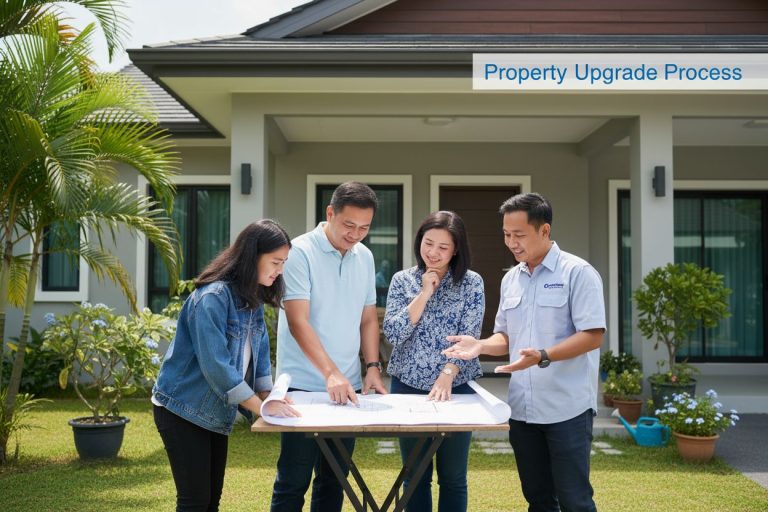Owning a home in Malaysia often feels out of reach when property prices keep climbing every year. Yet, here is what few realise. Malaysia has created specialised home financing options with government-backed schemes that can cover up to 90% of your property value. Instead of complex hurdles at every turn, the real surprise is how accessible and diverse home financing has become for all sorts of buyers.
Table of Contents
- Introduction To Home Financing In Malaysia
- Conventional Home Loans Explained
- Islamic Home Financing Options
- Government Housing Schemes
- Low-Deposit Home Loans
- Refinancing Your Home Loan
- Foreigners And Home Financing In Malaysia
Quick Summary
| Takeaway | Explanation |
|---|---|
| Understand your financing options | Familiarise yourself with various home financing methods to make informed decisions. |
| Evaluate credit and income stability | Assess your credit score and verify your income to improve approval chances for loans. |
| Explore government housing schemes | Government initiatives can make property purchase more accessible for first-time buyers. |
| Consider Islamic financing models | Explore Shariah-compliant options for ethical home purchasing methods. |
| Research refinancing benefits | Refinancing can optimise your loan terms, potentially lowering monthly payments and interest rates. |
1: Introduction to Home Financing in Malaysia
Home financing in Malaysia represents a complex ecosystem of financial solutions designed to help individuals and families achieve their property ownership dreams. Understanding the various types of home financing options is crucial for making informed decisions that align with your financial goals and personal circumstances.
Malaysia’s home financing landscape offers diverse pathways for potential homeowners, ranging from traditional bank loans to specialised government schemes. These financing mechanisms are tailored to address different income levels, employment statuses, and unique residential property requirements.
Key considerations when exploring home financing in Malaysia include:
- Income stability and verification requirements
- Credit score and financial history assessment
- Specific eligibility criteria for different financing programmes
The Malaysian property market has witnessed significant evolution in home financing strategies, with financial institutions and government agencies continuously developing innovative solutions to support home ownership. Bank Negara Malaysia plays a pivotal role in regulating and guiding these financial products, ensuring transparency and consumer protection.
While navigating home financing options might seem overwhelming, understanding the fundamental characteristics of each financing type can help you make strategic choices. Factors such as interest rates, repayment periods, down payment requirements, and potential government subsidies can significantly impact your long-term financial planning.
Moreover, Malaysia’s commitment to supporting first-time homeowners and middle-income groups has led to the creation of targeted financing programmes. These initiatives aim to make property ownership more accessible and affordable across different segments of the population.
Pro Tip: Before committing to any home financing option, conduct thorough research, compare multiple offerings, and consult financial advisors who specialise in Malaysian property financing.
2: Conventional Home Loans Explained
Conventional home loans represent the most traditional and widely used home financing mechanism in Malaysia, offering straightforward borrowing options for property purchases. These loans are primarily provided by commercial banks and financial institutions, functioning as standardised financial products designed to help individuals acquire residential properties.
Unlike specialised government schemes, conventional home loans operate on standard market principles, with interest rates and terms directly tied to an individual’s financial profile and creditworthiness. The application process typically involves comprehensive financial assessments to determine the borrower’s repayment capacity.
Key characteristics of conventional home loans include:
- Loan-to-Value (LTV) ratios typically ranging between 70% to 90%
- Interest rates that can be fixed or variable
- Repayment periods usually spanning 20 to 35 years
Bank Negara Malaysia reports that conventional home loans remain the primary financing method for most Malaysian homebuyers. The flexibility of these loans allows borrowers to select from various packages tailored to their specific financial circumstances.
Financial institutions assess several critical factors when processing conventional home loan applications. Credit score, employment stability, and income level are paramount in determining loan approval and interest rates. Potential borrowers must demonstrate consistent income and minimal existing financial obligations to secure favourable loan terms.
Interest calculation methods can significantly impact the overall loan cost. Borrowers can choose between Base Lending Rate (BLR) and Base Rate (BR) frameworks, each offering distinct advantages depending on individual financial strategies.
Pro Tip: Always compare multiple bank offerings and negotiate terms to secure the most competitive conventional home loan package that aligns with your long-term financial objectives.
3: Islamic Home Financing Options
Islamic home financing represents a unique financial approach that complies with Shariah principles, offering an alternative to conventional banking methods for Muslim homebuyers in Malaysia. These financing options operate on fundamental Islamic financial concepts that prohibit interest (riba) and promote ethical, transparent transactions.
The core principles of Islamic home financing revolve around partnership-based transactions where the financial institution and the homebuyer share ownership and risks. Unlike traditional loans, these financing mechanisms are structured to ensure mutual benefit and economic justice.
Key characteristics of Islamic home financing include:
- Halal compliance with Islamic financial regulations
- Transparent asset-backed financing models
- Risk-sharing arrangements between financial institutions and buyers
Bank Negara Malaysia plays a critical role in regulating and standardising Islamic financial products, ensuring they meet both religious and economic standards. Principally, Islamic home financing utilises two primary models: Murabahah and Musharakah Mutanaqisah.
The Murabahah model involves the bank purchasing the property and reselling it to the buyer at a predetermined markup price, allowing for structured and transparent payment schedules. Musharakah Mutanaqisah, alternatively, represents a diminishing partnership where the bank and buyer jointly own the property, with the buyer gradually purchasing the bank’s share.
Malaysian financial institutions have developed sophisticated Islamic financing products that cater specifically to different income brackets and property types. Explore our guide on specialised financing schemes to understand more about unique financing opportunities.
Pro Tip: When considering Islamic home financing, carefully review the specific terms, understand the total cost structure, and ensure complete alignment with both your financial goals and religious principles.
4: Government Housing Schemes
government housing schemes in Malaysia represent strategic initiatives designed to support home ownership across diverse population segments, particularly for middle-income groups and first-time homebuyers. These programmes aim to make residential property more accessible and affordable through targeted financial assistance and supportive policies.
The Malaysian government has developed multiple financing mechanisms to address housing challenges and promote equitable property ownership. These schemes are typically administered through various agencies and ministries, each targeting specific demographic groups with unique eligibility requirements.
Key government housing initiatives include:
- Skim Rumah Pertama (SRP) for first-time homebuyers
- Perumahan Rakyat programmes supporting low and middle-income groups
- Deposit protection and financial assistance mechanisms
Ministry of Housing and Local Government plays a pivotal role in developing and implementing these comprehensive housing strategies. These schemes are not merely financial products but represent broader social policies aimed at improving citizens’ quality of life.
Government servants, in particular, enjoy unique financing opportunities. Learn how government employees can leverage specialised financing options that provide more advantageous terms compared to conventional lending models.
Loan Guarantee Corporation (Syarikat Jaminan Kredit Perumahan Berhad orSJKP) offers critical support by providing guarantees that enable individuals with limited financial resources to secure home financing. These guarantees reduce risks for financial institutions and expand access to property ownership.
Eligibility criteria for government housing schemes typically consider factors such as:
- Annual household income
- Citizenship status
- First-time homebuyer qualifications
- Property value limitations
Pro Tip: Research specific programme requirements thoroughly and consult official government resources to understand the most suitable housing scheme for your individual circumstances.
5: Low-Deposit Home Loans
Low-deposit home loans represent an innovative financial solution for Malaysian homebuyers who struggle to accumulate substantial upfront capital. These specialised financing options significantly reduce the initial financial barrier to property ownership, enabling more individuals to enter the real estate market.
Traditionally, home loans required significant down payments, often ranging between 10% to 20% of the property’s total value. Low-deposit home loans challenge this conventional model by offering more accessible entry points for potential homeowners, particularly younger professionals and first-time buyers.
Key characteristics of low-deposit home loans include:
- Lower initial down payment requirements (sometimes as low as 2-5%)
- Flexible qualification criteria
- Potentially higher interest rates to offset reduced initial investment
Bank Negara Malaysia has been instrumental in encouraging financial institutions to develop more inclusive home financing products. These low-deposit options often come with specific conditions designed to manage financial risks while expanding homeownership opportunities.
Explore our insider tips on navigating home financing options to understand how to maximise these innovative loan structures.
The primary advantages of low-deposit home loans extend beyond immediate affordability. They provide strategic pathways for individuals who demonstrate strong earning potential but lack substantial savings. Credit score, employment stability, and income potential become more critical evaluation factors compared to traditional loan assessment methods.
Important considerations for potential applicants include:
- Comprehensive understanding of long-term financial implications
- Potential for higher cumulative interest payments
- Stricter ongoing financial performance monitoring
Pro Tip: While low-deposit home loans offer attractive entry points, carefully analyse the total cost of financing and ensure your long-term financial strategy can comfortably accommodate the loan’s requirements.
6: Refinancing Your Home Loan
Home loan refinancing offers Malaysian homeowners a strategic financial mechanism to optimise their mortgage terms, potentially reducing monthly repayments and accessing more favourable interest rates. This financial strategy involves replacing an existing home loan with a new loan that provides more advantageous conditions.
Refinancing is not merely about securing lower interest rates but represents a comprehensive financial restructuring approach. Homeowners can leverage this option to achieve multiple financial objectives, from reducing overall loan costs to accessing additional funds for personal investments or home improvements.
Key motivations for home loan refinancing include:
- Lowering monthly repayment amounts
- Reducing total interest paid over loan tenure
- Consolidating multiple debt obligations
- Accessing equity for additional investments
Bank Negara Malaysia regulates refinancing practices, ensuring transparency and protecting consumer interests. The refinancing process involves a comprehensive reassessment of the borrower’s current financial standing, credit history, and property valuation.
Credit score and current market interest rates play pivotal roles in determining refinancing feasibility and potential benefits. Financial institutions typically evaluate several factors, including remaining loan tenure, existing interest rates, and the borrower’s financial stability.
Explore our detailed guide on strategic home financing options to understand how refinancing can align with your long-term financial goals.
Important considerations for potential refinancing include:
- Potential processing and administrative fees
- Impact on overall loan tenure
- Comparative analysis of existing versus new loan terms
- Potential tax implications
Pro Tip: Conduct a comprehensive cost-benefit analysis before refinancing. Calculate potential savings against associated fees to ensure the refinancing strategy genuinely improves your financial position.
7: Foreigners and Home Financing in Malaysia
Home financing for foreigners in Malaysia represents a complex landscape with unique regulatory frameworks and specific eligibility requirements. Unlike local citizens, foreign property investors face more nuanced financial guidelines that significantly impact their property acquisition strategies.
Malaysian property regulations distinguish between different types of foreign property purchases, introducing specific constraints and opportunities for non-Malaysian nationals. These regulations aim to balance foreign investment interests with domestic housing market protections.
Key considerations for foreign home financing include:
- Minimum property value thresholds
- Restrictions on specific property types
- Additional documentation requirements
- Higher down payment expectations
Bank Negara Malaysia oversees foreign property investment regulations, establishing clear guidelines for non-citizen property acquisitions. Foreigners are typically required to navigate more stringent approval processes compared to local buyers.
Learn more about strategic property investment approaches to understand the intricacies of financing as a foreign investor.
Most financial institutions implement additional screening mechanisms for foreign applicants, evaluating factors such as:
- Employment status in Malaysia
- Current visa classification
- Income verification from international sources
- Existing financial commitments
Foreign property investors should anticipate higher interest rates and more restrictive loan-to-value ratios compared to local financing options.
The table below provides a comprehensive summary of the main types of home financing, their defining features, and important considerations as discussed throughout the article.
| Type of Home Financing | Main Features | Key Considerations/Potential Benefits |
|---|---|---|
| Conventional Home Loans | Traditional loans by banks; interest-based; LTV ratios 70%-90%; 20–35 year terms | Credit score and income are crucial; flexible packages; interest types |
| Islamic Home Financing | Shariah-compliant; interest-free; Murabahah & Musharakah Mutanaqisah structures; risk-sharing | Ethical purchasing; asset-backed; suitable for Muslim buyers |
| Government Housing Schemes | Targeted at first-time, middle- & low-income buyers; initiatives like Skim Rumah Pertama; deposit protection; SJKP guarantees | Income and citizenship requirements; often better terms for civil servants |
| Low-Deposit Home Loans | Lower upfront payments (sometimes 2-5%); flexible criteria; potentially higher interest | Easier access for youth/first-time buyers; assess long-term affordability |
| Refinancing Your Home Loan | Replace existing loan for improved terms; lower repayments; consolidate debts; access equity | Consider fees, long-term impact, and savings versus new costs |
| Foreigners and Home Financing | Stricter eligibility; higher down payments (30-50%); minimum property value thresholds; additional documents | Regulatory complexity; consult specialists; higher interest rates |
| General Advice for Homebuyers | Research options; assess income and credit; compare offerings; consult advisors | Better decision-making and financial management |
Pro Tip: Consult with Malaysian financial advisors specialising in foreign property investments to navigate the complex regulatory landscape and identify the most suitable financing strategies for your specific circumstances.
Take the Guesswork Out of Malaysian Home Financing and Construction
Worried about navigating complex home financing options and unsure how to connect your approved loan with a trustworthy construction partner? Many readers from the article “7 Types of Home Financing in Malaysia You Need to Know” feel overwhelmed by the fine print, the need for official approvals, and the challenge of stretching every ringgit for their dream home or renovation. Whether you are eyeing low-deposit entry points, LPPSA government staff schemes, or flexible repayment options, the process can feel daunting unless you find the right support and transparent guidance.

Let RumahHQ simplify your journey from financing approval to home completion. Our complete solutions are designed for Malaysians who need trustworthy construction, secured legal documentation, and access to reputable financing types such as LPPSA, KWSP, or KMMB. See our project workflow and financial pathways, or dive deeper into how government staff can leverage special financing schemes and discover expert tips to maximise your home financing. Take action now and book a free consultation with RumahHQ for a clear, step-by-step path from approval to handover. Start with confidence at RumahHQ.
Frequently Asked Questions
What are the main types of home financing available in Malaysia?
The main types of home financing in Malaysia include conventional home loans, Islamic home financing options, government housing schemes, low-deposit home loans, and refinancing options. Each type has unique characteristics and eligibility criteria that cater to different homebuyer needs.
How do conventional home loans differ from Islamic home financing?
Conventional home loans are traditional financial products provided by banks with interest-based structures, while Islamic home financing adheres to Shariah principles, avoiding interest and promoting ethical investment through profit-sharing or leasing arrangements.
What is the importance of credit score in securing a home loan?
A credit score is crucial in securing a home loan as it indicates a borrower’s creditworthiness. Financial institutions assess credit scores to determine loan eligibility, interest rates, and repayment terms. A higher credit score generally results in better financing options.
What should first-time homebuyers know about government housing schemes?
First-time homebuyers should be aware that government housing schemes offer financial assistance and targeted programmes designed to make homeownership more accessible. Eligibility typically considers household income, citizenship status, and property value limitations.
Recommended
- 7 Rahsia Pinjaman Perumahan di Malaysia Yang Anda Perlu Tahu Sebelum Memohon – Jangan Buat Kesilapan Ini! | RumahHQ – Kontraktor Bina & Renovate Rumah
- 8 Rahsia Untuk Memiliki Mansion Mewah Macam Jutawan – Nombor 5 Akan Buat Anda Terkejut! 😲💰🏰 | RumahHQ – Kontraktor Bina & Renovate Rumah
- 8 Rahsia Merancang Sistem Elektrik Rumah yang Selamat – Jangan Buat Silap, Nanti Menyesal! | RumahHQ – Kontraktor Bina & Renovate Rumah
- 7 Contoh Rumah HQ Mewah di Malaysia yang Akan Membuatkan Anda Terpesona! | RumahHQ – Kontraktor Bina & Renovate Rumah







